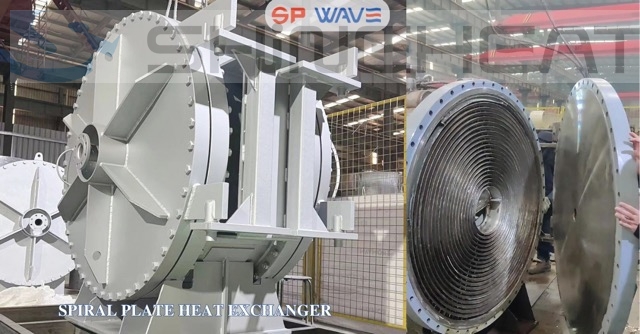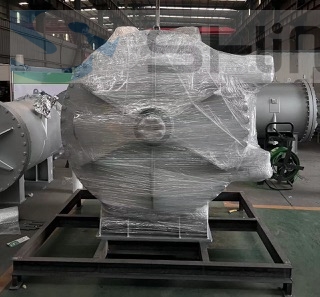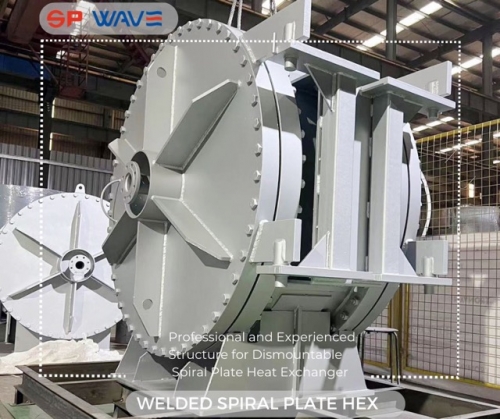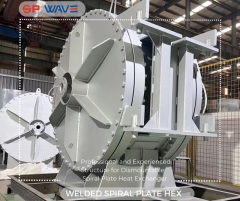Enhancing Cooling Efficiency in Brewery with SPWave Spiral Heat Exchanger
The brewing industry requires efficient and reliable heat exchange solutions to manage the cooling process of complex media like dextrinized wort. SPWave spiral heat exchangers have emerged as an innovative and optimal solution, offering a compact design,
DETAIL
Enhancing Cooling Efficiency in Brewery with SPWave Spiral Heat Exchanger


In the brewing industry, efficient processes and equipment are vital for producing high-quality alcoholic beverages. it requires efficient and reliable heat exchange solutions to manage the cooling process of complex media like dextrinized wort. The SPWave spiral heat exchanger stands out as an optimal solution that is increasingly being adopted by breweries worldwide. With its compact structure, customized wide channels, and high heat transfer efficiency, the SPWave spiral heat exchanger addresses the challenges posed by high viscosity and impurity-laden media commonly found in breweries.
The SPWave Features
Compact Structure:
The SPWave spiral heat exchanger features a compact design, making it ideal for breweries with limited space. Despite its small footprint, it offers significant heat transfer surface area, maximizing efficiency without sacrificing valuable floor space. This compactness allows breweries to optimize their production layout while still benefiting from superior heat exchange capabilities.
Customized Wide Channels:
One of the key advantages of the SPWave spiral heat exchanger is its ability to accommodate media with particles and impurities effectively. The unit is equipped with wide channels that are customized to handle such challenging fluids, ensuring thorough heat exchange. This feature is particularly beneficial in breweries where media like Dextrinized Wort, containing particles and impurities, require efficient cooling without clogging or fouling the heat exchanger.
High Heat Transfer Efficiency:
With its professional design, the SPWave spiral heat exchanger achieves exceptional heat transfer efficiency. The turbulent flow induced by the spiral plates promotes vigorous mixing of the fluid, maximizing heat exchange rates. This results in rapid cooling of the process fluid, reducing overall production time and enhancing productivity in the brewery. The high efficiency of the heat exchanger translates to energy savings and operational cost reduction, contributing to the sustainability of brewery operations.

Ease of Maintenance and Cleaning:
Maintaining hygiene standards is crucial in brewery operations. The SPWave spiral heat exchanger is designed with ease of maintenance and cleaning in mind. Its modular construction allows for quick disassembly and access to internal components, facilitating routine maintenance tasks. Furthermore, the smooth surfaces of the spiral plates minimize the buildup of deposits, simplifying cleaning procedures and ensuring consistent performance over time. This ease of maintenance and cleaning minimizes downtime and prolongs the lifespan of the heat exchanger, providing long-term reliability to brewery operations.
As supplier of SHINEHEAT, we understand the challenges of transporting heavy equipment over long distances. Our spiral heat exchangers weigh over 8 tons per unit, requiring customized packaging solutions to ensure both the safety of international transportation and the convenience of loading and unloading. With our custom packaging options, we guarantee secure handling and seamless logistics, allowing our clients to receive their equipment intact and ready for installation, no matter where they are located globally.


SPWave spiral heat exchanger offers a comprehensive solution to the challenges posed by high viscosity and impurity-laden media in breweries. Its compact structure, customized wide channels, high heat transfer efficiency, and ease of maintenance make it an ideal choice for enhancing cooling processes in brewery operations. By investing in the SPWave spiral heat exchanger, breweries can achieve improved productivity, energy efficiency, and operational reliability, ultimately leading to the production of high-quality alcoholic beverages.


In the brewing industry, efficient processes and equipment are vital for producing high-quality alcoholic beverages. it requires efficient and reliable heat exchange solutions to manage the cooling process of complex media like dextrinized wort. The SPWave spiral heat exchanger stands out as an optimal solution that is increasingly being adopted by breweries worldwide. With its compact structure, customized wide channels, and high heat transfer efficiency, the SPWave spiral heat exchanger addresses the challenges posed by high viscosity and impurity-laden media commonly found in breweries.
The SPWave Features
Compact Structure:
The SPWave spiral heat exchanger features a compact design, making it ideal for breweries with limited space. Despite its small footprint, it offers significant heat transfer surface area, maximizing efficiency without sacrificing valuable floor space. This compactness allows breweries to optimize their production layout while still benefiting from superior heat exchange capabilities.
Customized Wide Channels:
One of the key advantages of the SPWave spiral heat exchanger is its ability to accommodate media with particles and impurities effectively. The unit is equipped with wide channels that are customized to handle such challenging fluids, ensuring thorough heat exchange. This feature is particularly beneficial in breweries where media like Dextrinized Wort, containing particles and impurities, require efficient cooling without clogging or fouling the heat exchanger.
High Heat Transfer Efficiency:
With its professional design, the SPWave spiral heat exchanger achieves exceptional heat transfer efficiency. The turbulent flow induced by the spiral plates promotes vigorous mixing of the fluid, maximizing heat exchange rates. This results in rapid cooling of the process fluid, reducing overall production time and enhancing productivity in the brewery. The high efficiency of the heat exchanger translates to energy savings and operational cost reduction, contributing to the sustainability of brewery operations.

Ease of Maintenance and Cleaning:
Maintaining hygiene standards is crucial in brewery operations. The SPWave spiral heat exchanger is designed with ease of maintenance and cleaning in mind. Its modular construction allows for quick disassembly and access to internal components, facilitating routine maintenance tasks. Furthermore, the smooth surfaces of the spiral plates minimize the buildup of deposits, simplifying cleaning procedures and ensuring consistent performance over time. This ease of maintenance and cleaning minimizes downtime and prolongs the lifespan of the heat exchanger, providing long-term reliability to brewery operations.
As supplier of SHINEHEAT, we understand the challenges of transporting heavy equipment over long distances. Our spiral heat exchangers weigh over 8 tons per unit, requiring customized packaging solutions to ensure both the safety of international transportation and the convenience of loading and unloading. With our custom packaging options, we guarantee secure handling and seamless logistics, allowing our clients to receive their equipment intact and ready for installation, no matter where they are located globally.


SPWave spiral heat exchanger offers a comprehensive solution to the challenges posed by high viscosity and impurity-laden media in breweries. Its compact structure, customized wide channels, high heat transfer efficiency, and ease of maintenance make it an ideal choice for enhancing cooling processes in brewery operations. By investing in the SPWave spiral heat exchanger, breweries can achieve improved productivity, energy efficiency, and operational reliability, ultimately leading to the production of high-quality alcoholic beverages.


